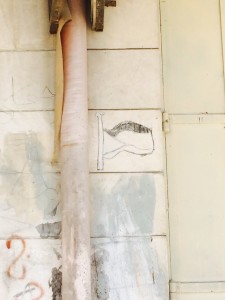For our final Ta Shema trip, we were supposed to visit Ramallah and Ariel. Ramallah is a large Palestinian city in the West Bank, and Ariel is a large Jewish city in the West Bank. This post needs a little background, so bear with me. Ramallah is located in Area A, an area which in the Oslo Accords was given completely to the Palestinian Authority. It is illegal for Israeli citizens to enter Area A without a special permit from the Israeli government. Our trip was scheduled for May 14-15, the same day as Nakba Day. Nakba, or “disaster” in Arabic, is the day of mourning recognized by Palestinians to remember 1948 when Israel won its independence. There were a number of people on our cohort, including our leader, who were Israeli citizens. The Israeli government decided not to give the Israeli citizens permits to go to Area A, Ramallah, on Nakba Day, and so we had to reorganize our trip and not go.
Of course, we were disappointed. It would have been an awesome experience to be able to see Ramallah and learn about the situation there, because the Israeli presence in the West Bank is felt differently in every city. We had an entire discussion about how we felt about not being able to go to Ramallah, and one thing that really struck me was how upset people were- at the Israeli government.
“Why are they restricting OUR movement?”
“I’m not just Israeli, I’m an American, too! I can go where I want!”
This particular restriction on movement is one of the compromises agreed upon in 1995 as part of the Oslo Accords, largely seen as the first step towards the establishment of a separate, sovereign Palestinian state- something which JStreetU claims to support 100%. But when these compromises actually affect us, we push back against them. Israel is blamed for “restricting” us from going to land which, in other conversations, these same people proclaim we have “no right to be on”.
It is this sort of thinking that perpetuates this conflict. The idea that compromise is good- as long it is other people compromising, and we do not have to bear the burden of that compromise. The idea that other people have to give things up, but we shouldn’t have to.
There was another reason that this situation rubbed me the wrong way. Nakba Day is a day of mourning, of remembrance, of grief. It seems to me that a group of Jewish students from Israel and America wandering around a Palestinian city on a day which is expressly against the creation of the state of Israel is disrespectful at least, and dangerous at worst. Israel had every reason to not grant permits to Israeli citizens on that day.
We discussed all of this in our group, but the fact that it even needed to be stated in such terms was shocking to me. Why was it that we do not want to abide by our compromise, but we expect others to? How can people simultaneously both condemn Jews for going into Palestinian areas and also feel entitled to go themselves on the most anti-Jewish and anti-Israeli day of the Palestinian calendar? These are questions that I do not have answers to, but certainly if these conversations are ones that must be had, please sit down with your friends, family, neighbors, community, please have them. Do not rest on your own entitlement while reserving your judgement for others.
